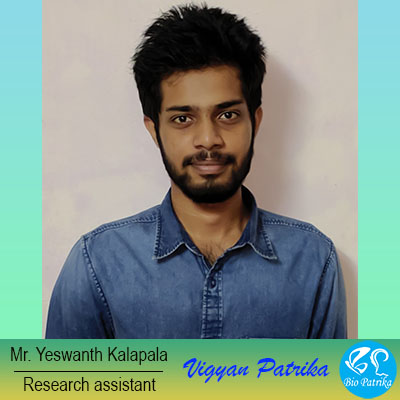Mr. Yeswanth Chakravarthy Kalapala’s interview with Bio Patrika hosting “Vigyan Patrika”, a series of author interviews. Mr. Kalapala is currently a Research assistant in the lab of Dr. Rachit Agarwal at Centre for Biosystems Science and Engineering, Division of Interdisciplinary Research, Indian Institute of Science (IISc), Bangalore. He published a paper titled “Antimycobacterial potential of Mycobacteriophage under disease-mimicking conditions” as a first author in Frontiers in Microbiology (2020).
How would you explain your paper’s key results to the non-scientific community?
Bacteria are one of the deadliest disease-causing agents for humans. Before the 19th century, a small cut to a finger was enough to send a person to an early grave. Luckily for us, Sir Alexander Fleming discovered penicillin and antibiotics were born. Antibiotics are like nuclear missiles against bacteria- highly effective and immediate in their action. However, unlike nuclear missiles, antibiotics leave survivors behind. These surviving bacteria are often resistant to the antibiotics and their populations increase in the absence of the antibiotic sensitive bacteria, increasing antibiotic resistance. This increase in antibiotic resistance could slowly drive us once again to a pre-antibiotic era of deadly bacterial infections. Luckily, nature has its own answer in the form of ‘Bacteriophage’, a virus that only infects and kills bacteria. This study uses these bacteriophages to show that bacteria like Mycobacterium smegmatis and Mycobacterium tuberculosis (Tb) could be possibly treated and even antibiotic-resistant bacterial infections could be potentially eliminated by designing specific bacteriophage treatments.

What are the possible consequences of these findings for your research area?
Our study’s findings call for a strategic design of phage therapy, keeping disease conditions and the conditions in which the bacteria grow in mind. We show that for Tuberculosis, designing phage therapy with the pH, nutrition and hypoxia in mind is essential. One of the most striking findings is the synergy of bacteriophages and antibiotics even in antibiotic-resistant bacteria, calling for co-treatment strategies, especially to treat antibiotic-resistant infections.
“[…] most striking findings is the synergy of bacteriophages and antibiotics even in antibiotic-resistant bacteria, calling for co-treatment strategies, especially to treat antibiotic-resistant infections.”
What was the exciting moment (eureka moment) during your research?
The most exciting moment for me, especially is seeing the killing action of bacteriophages on bacteria. I have never worked with bacteriophages before and I was really surprised at how neat and efficient they are at killing the bacteria. Another exciting moment came when we discovered a surprising synergy between our phage cocktail and the frontline antibiotic for Tb, Rifampicin. This synergy is both unexpected (considering Rifampicin is a nucleic acid inhibiting antibiotic) and welcome! This points towards the complexity of the interactions between bacteria, antibiotics and phage at the individual and population levels.
What do you hope to do next?
For this study, we are interested in looking at the phage-bacteria interactions at an individual level, especially in a nutrient-deprived environment where the bacteria have entered a state of replication arrest, which is often the case with Tb infections.
Where do you seek scientific inspiration?
I have been interested in science from a very early age, as most people are. When I was young, I used to be afraid of thunders and people have told me to invoke names of gods to appease them and the thunders wouldn’t harm me. But when I learned about the science behind thunders, I was blown away. I was also not scared of thunders anymore. I was in awe of them. The power of knowledge to obliterate the fear of the unknown has captivated me ever since and continues to do so. Working on the fringes of human knowledge, trying to expand it, is by itself inspirational for me.
How do you intend to help Indian science improve?
I believe India has some of the best scientific minds in the world. However, I firmly believe there is a lack of communication between the scientific community and the public. There is a lot of misinformation and quackery that happens in the name of ‘alternative medicine’. As a collective society, we should try to move beyond the misinformation and understand science and tell it apart from pseudoscience. One way to achieve that is by having a more friendly and open line of communication between our public and our best scientific minds at premier institutes. Therefore, I would like to focus on strong public outreach and my scientific endeavours to try and improve Indian scientific literacy. I am a strong believer in knowledge and its ability to empower people. As more people become scientifically literate, more people get into science and Indian science or science, in general, is bound to improve.
Reference
Kalapala Y C, Sharma PR and Agarwal R. Antimycobacterial potential of Mycobacteriophage under disease-mimicking conditions. Front. Microbiol. doi: 10.3389/fmicb.2020.583661.
Author introduction and research interests
I was born in Vijayawada, Andhra Pradesh. I finished my schooling in Chennai and moved to Bangalore for my Bachelors in Genetics, Biochemistry and Biotechnology at Jain University and then to London for Masters in Cancer Biology at Imperial College London. Upon finishing my Masters, I joined Dr. Rachit Agarwal’s lab as a Research Assistant and started working with Mycobacteria and antibiotic resistance. My project’s main focus is understanding host-bacteriophage interactions and designing bacteriophage treatments for antibiotic resistant slow growing mycobacterial infections. My research interests include Immunology, Cancer Biology, drug designing and drug resistance.
Email: yeswanthck@iisc.ac.in
Learn more about research of Dr. Rachit’s lab here https://be.iisc.ac.in/~rachit/
